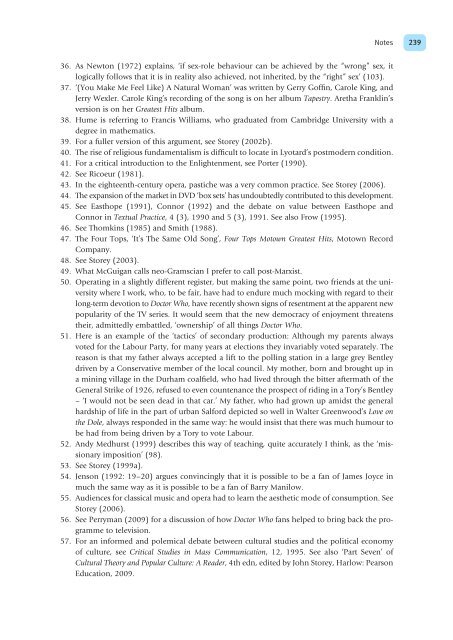Cultural Theory and Popular Culture
Cultural Theory and Popular Culture
Cultural Theory and Popular Culture
You also want an ePaper? Increase the reach of your titles
YUMPU automatically turns print PDFs into web optimized ePapers that Google loves.
36. As Newton (1972) explains, ‘if sex-role behaviour can be achieved by the “wrong” sex, it<br />
logically follows that it is in reality also achieved, not inherited, by the “right” sex’ (103).<br />
37. ‘(You Make Me Feel Like) A Natural Woman’ was written by Gerry Goffin, Carole King, <strong>and</strong><br />
Jerry Wexler. Carole King’s recording of the song is on her album Tapestry. Aretha Franklin’s<br />
version is on her Greatest Hits album.<br />
38. Hume is referring to Francis Williams, who graduated from Cambridge University with a<br />
degree in mathematics.<br />
39. For a fuller version of this argument, see Storey (2002b).<br />
40. The rise of religious fundamentalism is difficult to locate in Lyotard’s postmodern condition.<br />
41. For a critical introduction to the Enlightenment, see Porter (1990).<br />
42. See Ricoeur (1981).<br />
43. In the eighteenth-century opera, pastiche was a very common practice. See Storey (2006).<br />
44. The expansion of the market in DVD ‘box sets’ has undoubtedly contributed to this development.<br />
45. See Easthope (1991), Connor (1992) <strong>and</strong> the debate on value between Easthope <strong>and</strong><br />
Connor in Textual Practice, 4 (3), 1990 <strong>and</strong> 5 (3), 1991. See also Frow (1995).<br />
46. See Thomkins (1985) <strong>and</strong> Smith (1988).<br />
47. The Four Tops, ‘It’s The Same Old Song’, Four Tops Motown Greatest Hits, Motown Record<br />
Company.<br />
48. See Storey (2003).<br />
49. What McGuigan calls neo-Gramscian I prefer to call post-Marxist.<br />
50. Operating in a slightly different register, but making the same point, two friends at the university<br />
where I work, who, to be fair, have had to endure much mocking with regard to their<br />
long-term devotion to Doctor Who, have recently shown signs of resentment at the apparent new<br />
popularity of the TV series. It would seem that the new democracy of enjoyment threatens<br />
their, admittedly embattled, ‘ownership’ of all things Doctor Who.<br />
51. Here is an example of the ‘tactics’ of secondary production: Although my parents always<br />
voted for the Labour Party, for many years at elections they invariably voted separately. The<br />
reason is that my father always accepted a lift to the polling station in a large grey Bentley<br />
driven by a Conservative member of the local council. My mother, born <strong>and</strong> brought up in<br />
a mining village in the Durham coalfield, who had lived through the bitter aftermath of the<br />
General Strike of 1926, refused to even countenance the prospect of riding in a Tory’s Bentley<br />
– ‘I would not be seen dead in that car.’ My father, who had grown up amidst the general<br />
hardship of life in the part of urban Salford depicted so well in Walter Greenwood’s Love on<br />
the Dole, always responded in the same way: he would insist that there was much humour to<br />
be had from being driven by a Tory to vote Labour.<br />
52. Andy Medhurst (1999) describes this way of teaching, quite accurately I think, as the ‘missionary<br />
imposition’ (98).<br />
53. See Storey (1999a).<br />
54. Jenson (1992: 19–20) argues convincingly that it is possible to be a fan of James Joyce in<br />
much the same way as it is possible to be a fan of Barry Manilow.<br />
55. Audiences for classical music <strong>and</strong> opera had to learn the aesthetic mode of consumption. See<br />
Storey (2006).<br />
56. See Perryman (2009) for a discussion of how Doctor Who fans helped to bring back the programme<br />
to television.<br />
57. For an informed <strong>and</strong> polemical debate between cultural studies <strong>and</strong> the political economy<br />
of culture, see Critical Studies in Mass Communication, 12, 1995. See also ‘Part Seven’ of<br />
<strong>Cultural</strong> <strong>Theory</strong> <strong>and</strong> <strong>Popular</strong> <strong>Culture</strong>: A Reader, 4th edn, edited by John Storey, Harlow: Pearson<br />
Education, 2009.<br />
Notes 239
















